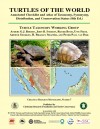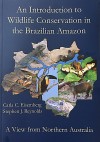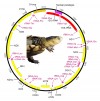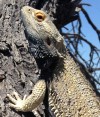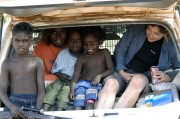


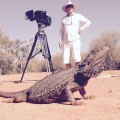
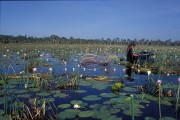
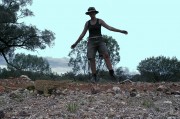
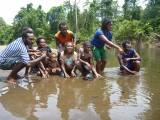

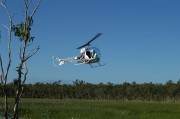
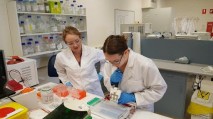

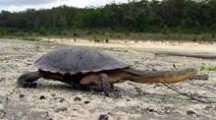

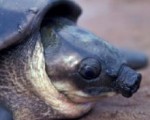
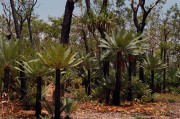
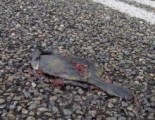

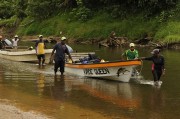
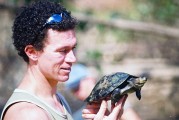
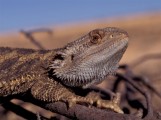

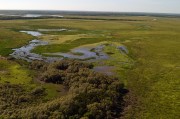
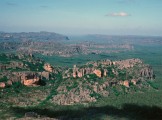

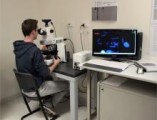
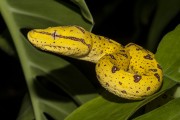
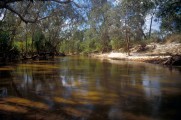
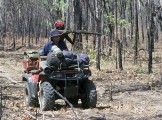

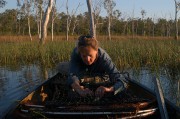
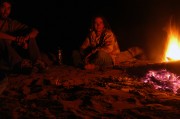

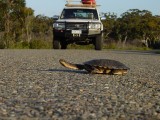

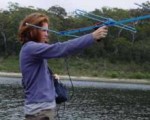
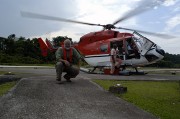
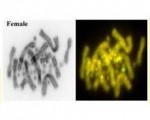

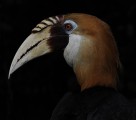

NewsBlog
Turtles of the World
Posted in Turtle Research on Aug 04, 2017
The 8th Edition of the Turtles of the World Annotated Checklist and Atlas of Taxonomy, Synonymy, Distribution, and Conservation Status is now available on line. This is a spectacular compendium of the latest scientific assessment of turtle species globally, and comes with new distribution maps and photos in addition to the taxonomic accounts.
Wildlife Conservation in the Amazon
Posted in Education and Outreach on Jul 30, 2017
For many of us the astounding diversity of life on earth is an endless source of amazement and wonder. Nowhere better exemplifies the diversity of life on earth than the Brazilian Amazon. The Amazonian rainforests is widely recognized for its megadiversity. A new book, prepared by IAE Alumna Carla Eisemberg and Stephen Reynolds, provides a good introduction for those planning a visit. This book is a good read, providing insight to the unique biota and ecosystems of the Brazilian Amazon, the challenges we face in conserving the biodiversity of this megadiverse region, and the actions that are being taken to achieve this conservation. It is a good and insightful read even for those who may never have the opportunity to visit Brazil.
Rare turtle's relationships resolved
Posted in Turtle Research on Jul 25, 2017
Congratulations to Xiuwen Zhang for her article resolving the phylogenetic relationships of the enigmatic Western Swamp Turtle using whole mitochondrial sequencing. The online version of the article, co-authored by Peter Unmack, Gerald Kuchling, Yinan Wang and Arthur Georges, appeared today in the journal Molecular Phylogenetics and Evolution.
Key piece discovered in the jigsaw puzzle that is reptilian sex determination
Posted in Pogona Research on Jun 28, 2017
The mechanism by which temperature exerts its influence on offpring sex has baffled scientists for over 50 years, since the phenomenon was first discovered. In a paper recently published in Science Advances (June 14, 2017), we believe we have discovered an important piece of the puzzle, a temperature sensitive transcripional modification to an influential chromatin modifying gene, Jumonji.
Tropical Turtle Diets
Posted in Turtle Research on May 31, 2017
Congratulations to Mick Welsh on publishing his honours work. There have been few community studies of Australian freshwater turtles. The present study examined the diet and microhabitat use of 5 species of freshwater turtles from the Daly River, Northern Territory. Dietary shift with age was observed for most turtle species, and between species there was differentiation of diet and microhabitat use. The study also showed that in the dry-season, freshwater turtles in a perennial tropical river like the Daly River rely on aquatic vegetation and molluscs. Photograph: Megacephalic Emydura victoriae from the Daly River.
Sex in Dragons -- Ecological drivers of transitions between GSD and TSD
Posted in Pogona Research on May 09, 2017
The Institute for Applied Ecology is seeking two PhD students with interests in population genetics and reptile ecology/physiology to investigate the field-based mechanisms of sex reversal in the dragon lizard, Pogona vitticeps.Expressions of interest before June 10.
Sex in Dragons -- Modelling evolutionary transitions
Posted in Pogona Research on May 08, 2017
Sex in Dragons – Modelling evolutionary transitions in sex determination. We are currently seeking a PhD student with interests in biological responses to climate change, evolution and theoretical biology to investigate the evolutionary and ecological dynamics of sex determination in the dragon lizard, Pogona vitticeps. Expressions of interest before June 10.
PhD Project Scholarship: Sex in Dragons
Posted in Pogona Research on May 05, 2017
Sex in Dragons – Pinning down the mechanisms of sex determination in a reptile. We are currently seeking at least one, but potentially several, PhD students with interests in genetics, evolution and developmental genomics to investigate the molecular mechanisms through which sex is determined in the Australian central bearded dragon lizard, *Pogona vitticeps*. Expressions of interest before June 10.
NCBI Pogona annotation complete
Posted in Pogona Research on Apr 24, 2017
NCBI has completed the annotation of the Pogona genome generated by the genetics and genomics team of the IAE, and made it widely available to the global research community. From the NCBI site, you can download the genome, view details of the annotation, blast any sequence against the genome, see the genes in "Gene", and in a few weeks, browse the genome using the NCBI Browser.
Workshop: Museum genomics in practice
Posted in Turtle Research, Education and Outreach on Apr 05, 2017
Having a great time at the Museum Genomics in Practice workshop organised by Craig Moritz and the team at the Centre for Biodiversity Analysis.
